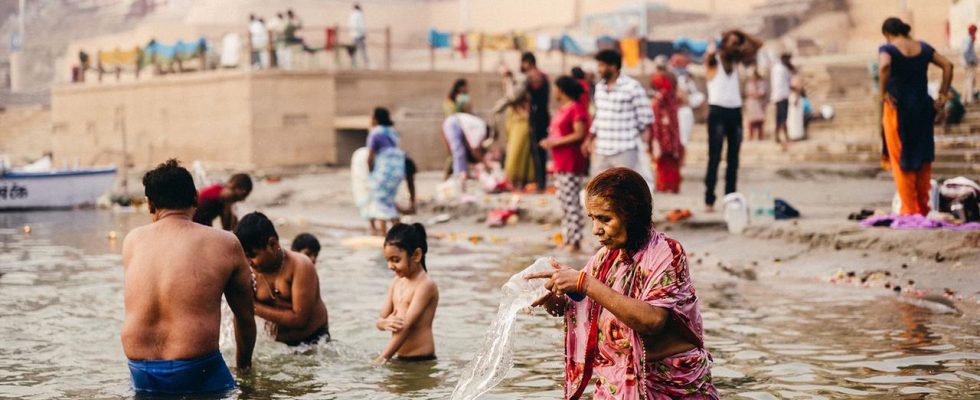Varanasi is considered India’s holiest city and India’s longest river flows through it. Hindus traditionally believe in the healing properties of the Ganges – even though its water is extremely polluted here.
At a quarter to six in the morning on the banks of the Ganges in Varanasi. At sunrise, Vishwambhar Nath Mishra climbs into India’s holiest river. He dives into it exactly six times and takes two sips out of the water. He then prays to the sun god, quoting old mythological texts. It is a ritual that Mishra performs every morning.
Mishra has a very special connection with India’s longest river. He is a temple priest, a professor of engineering and at the same time heads an organization that takes care of cleaning the river. “We believe in the power of the Ganges,” he says. “For me the river is pure. Despite all the pollution. Whoever comes to Varanasi bows to the Ganges.”
Vishwambhar Nath Mishra knows how polluted the Ganges is. Nevertheless, he bathes in the holy river every morning.
One of most polluted Rivers worldwide
The Ganges supplies around 40 percent of India’s population with water. According to studies, it is one of the most polluted rivers in the world. “In Varanasi alone, drains are discharged unfiltered into the river at 22 different places,” explains Udai Kant Chaudhary, director of the Institute for Ganga Management. “This means that a large number of pollutants end up in the Ganges.”
In Varanasi, scientists have found extremely high levels of heavy metals such as lead and mercury in some places. Numerous pathogens such as bacteria, viruses and parasites have already been detected here, which lead to serious health problems. In addition, various chemicals, including pesticides, solvents and oils, flow into the Ganges and cause lasting damage to the water quality.
According to belief, a sip of the holy Ganges water can cure all diseases.
Belief in holy power
However, for many people in Varanasi, scientific facts seem to be less important than faith. The city is considered holy for many millions of Hindus. According to legend, Varanasi is home to the important deity Shiva. Hindus see the personified river goddess Ganga in the Ganges itself. According to belief, taking a dip in the Ganges can help get rid of all sins. A sip of the holy water is said to be able to cure all illnesses.
Ram Bali also believes in this. He is 73 years old and has worked as a boat driver on the Ganges for more than five decades. “I also drink the water more often,” he says. “It’s sacred, after all.” He doesn’t believe that the water could harm him. Quite the opposite. “I owe all my health and energy to the Ganges,” says Ram Bali with a joyful smile on his face.
Ram Bali is 73 years old and says he owes his health and energy to the waters of the Ganges. It couldn’t do him any harm.
“Fish can no longer survive”
Vishwambhar Nath Mishra and his employees regularly travel to one of the points where sewage is discharged into the river. The smell of feces is in the air; the dark brown water flows into the Ganges at high pressure. “If you want to drink from the Ganges, you should actually be sure that there are no feces in the water,” says Mishra. “But you can see with the naked eye that this is not the case.”
One of Mishra’s employees takes a water sample. In the past, they have proven in the laboratory that in many places there are so many bacteria in the water that fish can no longer survive. “Not enough is being done to combat pollution. Why? You have to ask politicians that,” said Mishra. When asked whether he would continue to bathe in the river in the morning despite the high level of pollution, Mishra says: “Of course, I love the Ganges.”
“Varanasi – City of Happy Death” – the 45-minute documentary by Oliver Mayer and Felix Leichum can be viewed on Monday, February 26th. at 10:50 p.m. on Erste or now in the ARD media library.
Oliver Mayer, ARD New Delhi, tagesschau, February 25, 2024 12:52 p.m

